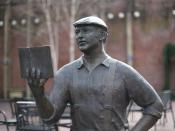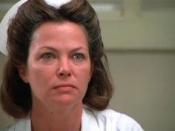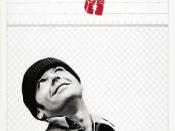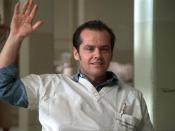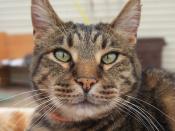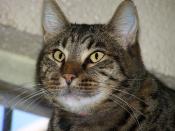One Flew Over the Cuckoo's Nest Ken Kesey A Character Sketch of Randle P. McMurphy Randle P. McMurphy is one of the central character's in a fascinating and complex book, called One Flew Over the Cuckoo's Nest by Ken Kesey. This story takes place within the harsh walls of an Oregon mental hospital ruled by the iron hand of a repressive dictator called Nurse Ratched. The reader first meets Randle P. McMurphy through the eyes of the book's narrator, a paranoid-schizophrenic, named, Chief Bromden. It's hard to see the real McMurphy at first ,because Chief Bromden has so many hallucinations which distort the size of things and at the same time, he sees the world literally through a fog. Over the course of the novel , the Chief's hallucinations will come and go as the fog advances and retreats. It is after the first chapter, when I began to get a clear understanding of the Chief's odd perception of surroundings, that McMurphy started to emerge as a real character, and I could begin to piece together the clues.
The first words the Chief uses to describe McMurphy are he is "no ordinary admission." This is because McMurphy is not crazy. As it turns out, he is a charming convict and con man who fakes mental illness to get out of working at the Pendleton prison farm. He is a handsome, tall man with long red sideburns and is "broad across the jaw and shoulders and chest." He also has a "devilish grin" and a booming voice with a distinctive laugh. McMurphy's laugh is the first real laugh the Chief has heard in years. His laugher echoes through the bleak and gray ward to light up the place the Chief has nicknamed the "Combine." He immediately captures the admiration of the other inmates with his tales of fighting, gambling, and women.
He seems to be afraid of nothing including the Big Nurse (Nurse Ratched) who runs the ward like a well oiled machine.
At the hospital becomes the leader of the patients and a thorn in the side of Nurse Ratched. McMurphy can't take a step without disrupting normal hospital procedures. He won't shower, and he won't stand still to have his temperature taken. He even fakes taking his daily medication so he won't be tranquilized like the other patients. He is friendly and outgoing towards the other inmates. He tries to bring about a change at the hospital because he does not like the fact the grown men act like timid scatter-brained "rabbits" who are submissive to the Big Nurse as if she were a "wolf." He desperately tries to "get her goat" by not doing the duties he is given. He even disrupts her group therapy sessions by hogging the limelight and mocking her for being overly prim. He sees that she controls the other patients by turning them against each other in group therapy. McMurphy may not be educated, but he is smart in the ways of the world. Because he is a con man he is street wise and understands that the Big Nurse is controlling by subtly destroying her patients' self confidence. He says of Nurse Ratched, "She fooled me with that kindly little old mother bit for maybe three minutes when I came in this morning, but no longer." The Big Nurse and McMurphy are exactly the opposite in character. She demands control on every front and he basks in his freedom and mocks her with it. When she doesn't let the patients watch the World Series he makes her loose her temper by having everyone gather around a blank TV set and believe that the Series is being televised. Laughter echoes through the stark halls and infuriates the humorless nurse. She cannot control the reality of the patients anymore, because laughter has liberated them.
McMurphy is also sly and cunning. When he learns that an involuntarily committed patient cannot get out of the hospital unless the Big Nurse approves, he tries to be a model inmate. But by this time the others in his group -- the Chief, Dale Harding, Billy Bibbit, Cheswick, and Big George have begun to look to him as their leader. Cheswick is McMurphy's closest friend. When McMurphy begins to behave himself, Cheswick feels betrayed and abandoned. Cheswick drowns himself in the hospital pool. It is then that McMurphy reveals his true loyalty and character. He realizes that most of the patients in the group have voluntarily committed themselves and stay in the hospital out of choice and fear. He begins to see himself as a tool in bringing freedom to the other mental patients and in exposing the Big Nurse for what she really is -- a sadist who preys on their fears to control them. In an act of brave defiance he shows his fearlessness by smashing the Nurse Station's window. From here on in, to me McMurphy becomes a hero, because he is not driven simply by his own selfish needs. He senses that these men need a leader, and for the first time in his life he rises to meet responsibility head on. He teaches the other patients -- through fun basketball games and fishing trips -- not to let their fears paralyze them. During the fishing trip, when he has sneaked them out to the open sea, the inmates are giddy with freedom and laughter. Its through laughter that McMurphy tries to reach the other men and teach them that they are sane. The book is full of humor no matter how bleak things become in the hospital. Chief Bromden says of McMurphy, "He knows you have to laugh at the things that hurt you just to keep yourself in balance, just to keep the world from running you plumb crazy." McMurphy continues to be loyal to his friends even when it endangers him. When the orderlies humiliate George, a patient with germ phobias, McMurphy defends him. The Big Nurse retaliates by sending him for shock therapy. When he returns he is still unrepentant and refuses to be controlled. He will now fight to the death for the patients' freedom.
In complete defiance of Nurse Ratched, McMurphy smuggles some girls in for a party. It is also the night McMurphy plans on escaping the hospital with the Chief's help. However, McMurphy sees an opportunity to help another patient, Billy Bibbit who has always been afraid of girls because of his dominating mother. McMurphy then arranges a date with one of the girls for Billy and procrastinates about escaping. Clearly, McMurphy is taking a chance and sacrificing his own freedom for the freedom of his friend. When Nurse Ratched finds Billy with the girl, she ridicules him and tells him she is going to tell his mother. In despair, Billy kills himself. It is then that the completely transformed McMurphy takes a final stand against the oppressive Big Nurse by attacking her and ripping her shirt open. In his fearlessness and self sacrifice for the others he seals his fate. She has him lobotomized and he, in essence, becomes a vegetable. The Chief will not let his friend remain in this pathetic condition and smothers him with a pillow. Then the Chief escapes.
In conclusion, to me each has given each other an important gift. The Chief gives McMurphy back his dignity in death. McMurphy would feel a life without freedom is not worth living. Finally, through his example, McMurphy has given the Chief the courage to face life in the outside world. The friendship between these two characters, both in a desperate situation, is very inspiring. McMurphy has the kind of humor, courage, and loyalty, I would consider very lucky to have in a friend. He also has an innate wisdom about the world and an ability to see beyond appearances that I find admirable and would like to emulate.
